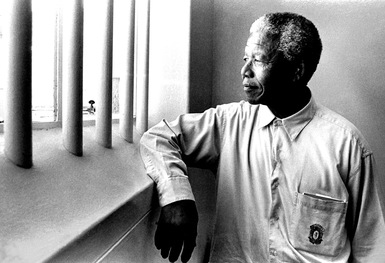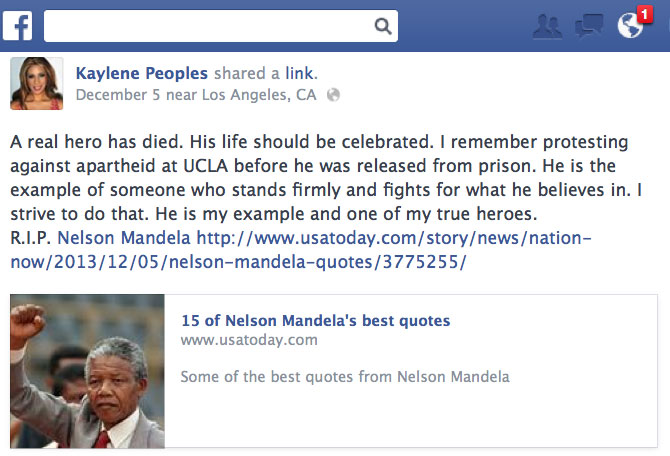Nelson Mandela and Why We Should Celebrate His Life
By Kaylene Peoples | December 19th, 2013 | Category: Articles, Letter from the Editor | 2 comments When I learned that Nelson Mandela had passed away, I was sad. Mandela lived a martyred life for so long and then finally came to power in South Africa after years of imprisonment. He lived to be 95 years old. Not to date myself, but I recall protesting in college against Apartheid and almost landing in jail. I wanted to further show my support by traveling to Berkeley with other U.C.L.A. students like me who were “anti-Apartheid.” My parents wouldn’t hear of it, not because they didn’t approve of what I was doing. In fact, they were proud that I believed so strongly in something that I was willing to stick my neck out (on a local level) without worrying about the consequences. But they managed to talk me down. My father dangled the hefty college price tag in my face and guilted me into not lighting a match to his hard-earned money to pay my college tuition. So I conceded. But I still held my own personal protests. Burger King, Shell Oil, and other businesses that were investors in South Africa were on my boycott list. Unfortunately at the time, this was the only way I could show my support.
When I learned that Nelson Mandela had passed away, I was sad. Mandela lived a martyred life for so long and then finally came to power in South Africa after years of imprisonment. He lived to be 95 years old. Not to date myself, but I recall protesting in college against Apartheid and almost landing in jail. I wanted to further show my support by traveling to Berkeley with other U.C.L.A. students like me who were “anti-Apartheid.” My parents wouldn’t hear of it, not because they didn’t approve of what I was doing. In fact, they were proud that I believed so strongly in something that I was willing to stick my neck out (on a local level) without worrying about the consequences. But they managed to talk me down. My father dangled the hefty college price tag in my face and guilted me into not lighting a match to his hard-earned money to pay my college tuition. So I conceded. But I still held my own personal protests. Burger King, Shell Oil, and other businesses that were investors in South Africa were on my boycott list. Unfortunately at the time, this was the only way I could show my support.
What is Apartheid? Apartheid was a system of racial segregation in South Africa, made legal in 1948 through legislation by the National Party governments. Rights and certain freedoms were taken away from Blacks. This lasted for 46 years. Apartheid is another word for legalized “slavery.” Under the Dutch rule, which pushed to make Apartheid legal, a variety of racial groups (Black, White, Colored, and Indian) were divided into sub-classifications; and residential areas were separated from other racial groups. Meaning, if you weren’t a member of a certain ethnicity, you would be forcibly removed from your home and put into basically a “ghetto,” filled only with those sharing your same race . . . much like what happened with the Jews during WWII. Additionally, any non-white who held a political position was immediately stripped of his title, duty, and salary. In 1970 the citizenship of all Blacks in South Africa was revoked. The government segregated education, beaches, medical care, public services, etc., and provided blacks with any and everything that was inferior to whites. Again, this was the legislation. It was no surprise that a civil war was brewing. With much dissidence, the people of South Africa were living in constant fear of their lives.
As I watched the news, daily reports of killings and violation of human rights perpetrated by patriots and “underground” armies created anarchy in South Africa. The “non-citizens” were met with repeated executions, whole towns being slaughtered, and a death toll rising exponentially. The situation had become intolerable by the world. Now looking back, I recall debates with emotionally charged African Americans, who related to the mistreatment of their enslaved ancestors. I remember soberly hearing the arguments of my classmates who were business majors. They feared Apartheid’s potential effects on our economy because trade and tourism were big businesses.
 So how does Nelson Mandela fit into all of this? If you are on top of your world politics, you already know that Nelson Mandela was a South African anti-apartheid revolutionary, politician, and philanthropist. He was the President of South Africa from 1994-1999. He was the first person to be elected in a fully representative democratic election. During his presidency, he spearheaded the dismantling of apartheid. He abolished institutionalized racism, forced poverty, and inequality. His legislation fostered racial reconciliation.
So how does Nelson Mandela fit into all of this? If you are on top of your world politics, you already know that Nelson Mandela was a South African anti-apartheid revolutionary, politician, and philanthropist. He was the President of South Africa from 1994-1999. He was the first person to be elected in a fully representative democratic election. During his presidency, he spearheaded the dismantling of apartheid. He abolished institutionalized racism, forced poverty, and inequality. His legislation fostered racial reconciliation.
Why is Nelson Mandela so significant? He served in prison for 27 years because he led the fight to overthrow the injustices of racial inequality and non-citizenship in his country. His loyal anti-apartheid revolutionary supporters lobbied for his release in 1990 during the heat of strife resulting from apartheid-related civil disobedience. Nelson Mandela was the poster child for the abolishment of “slavery” in South Africa, resulting in the freedom of millions of South Africans.
When I posted a comment on Facebook on December 5, 2013, after I learned of Mandela’s passing, I received a lot of “likes,” but I also received a private Facebook message from a “friend of a friend” that disturbed me. It read, “ . . . Why are so many people posting about this man on Facebook? Who cares . . .” After I saw this message, I realized there were people who didn’t know about South Africa’s plight and what the government—and especially Nelson Mandela—endured to free his people from subjugation. I wanted to let the uninformed know just who this man was, and still is to me; and what Mandela’s actions for his own country did for the world. I wanted all of Agenda readers to be on the right side of history!
“I have fought against white domination, and I have fought against black domination. I have cherished the ideal of a democratic and free society in which all persons live together in harmony and with equal opportunities. It is an ideal, which I hope to live for and to achieve. But if needs be, it is an ideal for which I am prepared to die.” –Nelson Mandela’s speech at the end of his trial, while facing the death penalty, April 20, 1964.










There is no point arguing that Nelson Mandela is one of the gestaret leaders the African continent has produced in history. Here are some of Nelson Mandela’s best quotes:“I am fundamentally an optimist. Whether that comes from nature or nurture, I cannot say. Part of being optimistic is keeping one’s head pointed toward the sun, one’s feet moving forward. There were many dark moments when my faith in humanity was sorely tested, but I would not and could not give myself up to despair. That way lays defeat and death”. I dream of the realization of the unity of Africa, whereby its leaders combine in their efforts to solve the problems of this continent. I dream of our vast deserts, of our forests, of all our great wildernesses .“No one is born hating another person because of the color of his skin, or his background, or his religion. People must learn to hate, and if they can learn to hate, they can be taught to love, for love comes more naturally to the human heart than its opposite.”“I have walked that long road to freedom. I have tried not to falter; I have made missteps along the way. But I have discovered the secret that after climbing a great hill, one only finds that there are many more hills to climb. I have taken a moment here to rest, to steal a view of the glorious vista that surrounds me, to look back on the distance I have come. But I can only rest for a moment, for with freedom come responsibilities, and I dare not linger, for my long walk is not ended.” “One of the things I learned when I was negotiating was that until I changed myself, I could not change others.” “Overcoming poverty is not a task of charity, it is an act of justice. Like Slavery and Apartheid, poverty is not natural. It is man-made and it can be overcome and eradicated by the actions of human beings. Sometimes it falls on a generation to be great. YOU can be that great generation. Let your greatness blossom.” +4Was this answer helpful?
Having left Los Angles in 2005, I now live in a small town in Northern New Mexico. My town, the original Las Vegas (pop. 14,000) has been populated by Navajo, Comanche and Apache tribes for thousands of years, settled by the Spanish 400 years ago, and established as a city in 1835. Las Vegas is home to the only U.S. campus of a renowned international school called, United World College. (There are 12 UWC campuses throughout the world.)
Until his death, Nelson Mandela was the Honorary President of UWC. His life embodied the spirit of the school, which is to bring together young, bright students from all over the world to live and study together, to get to know each other and learn something about each other’s culture and history. This is, of course, the first step in creating a truly “United World”.
The students at United World College represent over 70 nations, and they are the best and the brightest! (Mandela’s own children and grandchildren attended UWC.)
I have pasted in an email from UWC regarding the loss of Mandela below.
Mandela is a man who consistently stood up for what is right, and was willing to speak the truth and fight for justice, no matter the consequences. The world needs more men like him. He has certainly been an inspiration to me.
Roy Montibon
http://www.montibon.com
Begin forwarded message:
From:
Date: December 5, 2013 3:44:34 PM MST (CA)
To: ram@sn1054.com
Subject: UWC-USA Mourns Mandela
UWC-USA, along with the entire UWC family, mourns the death of our honorary president, Nelson Mandela. A Nobel Peace Prize winner and South Africa’s first black president, the 95-year-old Mandela died today, Dec. 5. He had been very ill, and had been receiving intensive home care since being released from the hospital in September.
”Perhaps more than any individual in our lifetime, Nelson Mandela lived out the ideals of our movement,” UWC-USA Acting President Tom Oden said. “He believed deeply in education, he dedicated his life to peace, and one of the most lasting aspects of his immense legacy will be the way he led South Africa, and by extension the world, in the transition from the shackles of apartheid to a sustainable democracy.”
UWC Executive Director Keith Clark said Mandela’s life “was an inspiration for our movement and its values of peace and sustainability.”
“We are proud that Mr. Mandela’s children and grandchildren were educated at UWC Waterford Kamhlaba, showing his belief in and commitment to the work we do,” Keith said. “Part of his legacy will be the example he set of striving to spread peace and justice in the world, his ability to forgive and inspire others to do the same and his understanding of the role education plays in bringing positive change.”
Like students everywhere, UWC-USA students stood in solidarity with Mandela during the darkest days of apartheid. Tom, who lived in South Africa during the last year of Mandela’ presidency, remembers being struck by UWC-USA’s activism.
“When I first came to UWC-USA, the story that grabbed my attention was when the entire school walked from Santa Fe to Montezuma in 1990 to raise awareness about apartheid,” he said. “My hope is that we, as a school, will continue to honor him in that fashion, by taking direct action in service of the ideals that guided Nelson Mandela’s life. In his words, ‘It always seems impossible until it is done.’”
http://uwc-usa.org